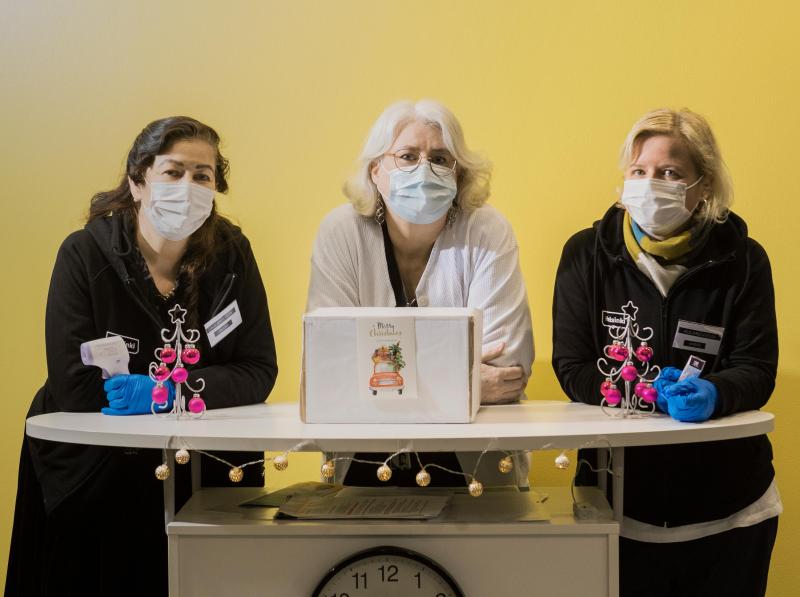New opportunities to change roles
Our employees need new or modified duties if their usual work ends or they are unable to continue in their normal role due to health reasons. The pandemic afforded opportunities to relocate.
New alternative duties were tailored for transferring employees, because the pandemic resulted in new roles, such as lobby workers, at the social and health care provision locations.
What did this mean in practice? Jaana Berg, Carita Lindbom and Virpi Lindfors with their thermometers are ready to welcome new customers in the lobby of Vuosaari family, health and well-being centre.
Vuosaari is the first place in Helsinki to have lobby workers take customers’ temperature when they enter the centre. The work is easy to do with ear and forehead thermometers. These devices display the results immediately.
All three women transferred to their new roles in August through reallocation.
Previously, Jaana Berg and Virpi Lindfors worked in a kitchen, but both began to suffer from back problems. Carita Lindbom used to work as an office secretary.
The three ladies are visibly happy with their temporary jobs during the pandemic.
Lobby workers make sure that none of the people arriving at social and health care units have coronavirus symptoms and advice them about test sites, if necessary. Even in their sleep, they would know to ask new arrivals whether they have a sore throat, a cough, a runny nose or stomach problems, and whether their sense of smell and taste are normal.
‘This is genuine customer service. Generally speaking, our customers probably understand our role, and I have become familiar with people who come here often,’ Lindfors says.
Agile HR policies
A good example of agile and innovative HR policies is the hiring of these lobby workers. It also shows how well a large organisation is able to act quickly when necessary.
The lobby workers’ supervisor, Arttu Teivainen, says that most of the lobby workers are people who have been reallocated, but when more were needed at roughly 30 of the City’s units, lobby workers were also hired from outside the city organisation. By the end of the year, their number stood at 54.
‘Overall, the hiring has gone really well, and we have found fantastic people to work in our lobbies,’ Teivainen says.
In addition to health stations, family centres and dental clinics, lobby workers welcome customers to health and well-being centres, coronavirus testing sites and, since the end of last year, vaccination centres.
A virtual job offer café
We offer our workers new work opportunities through reallocation if their duties end or if they are no longer able to carry out their usual duties due to health reasons. Our Helbit recruitment system contains a job application database for transferring employees, and over 100 staff members have already used the system to apply for a new job.
A work ability network, launched by HR experts who manage the transfers, enhanced its operations and started a so-called job offer café, a virtual meeting place on Teams.
At this virtual café, suitable talent is identified from amongst the transferring people to fill the available roles. The aim is to find talents from within our own organisation, across all divisions and municipal enterprises.
The idea for the café came from the work ability coaches, who manage the transfers and serve as HR experts. The first person to take responsibility for running the café was Lea Laitanen-Juslin from the Social Services and Health Care Division.
Approximately 300 people are transferred annually, and 127 of them in 2020 were actively seeking a new job.

